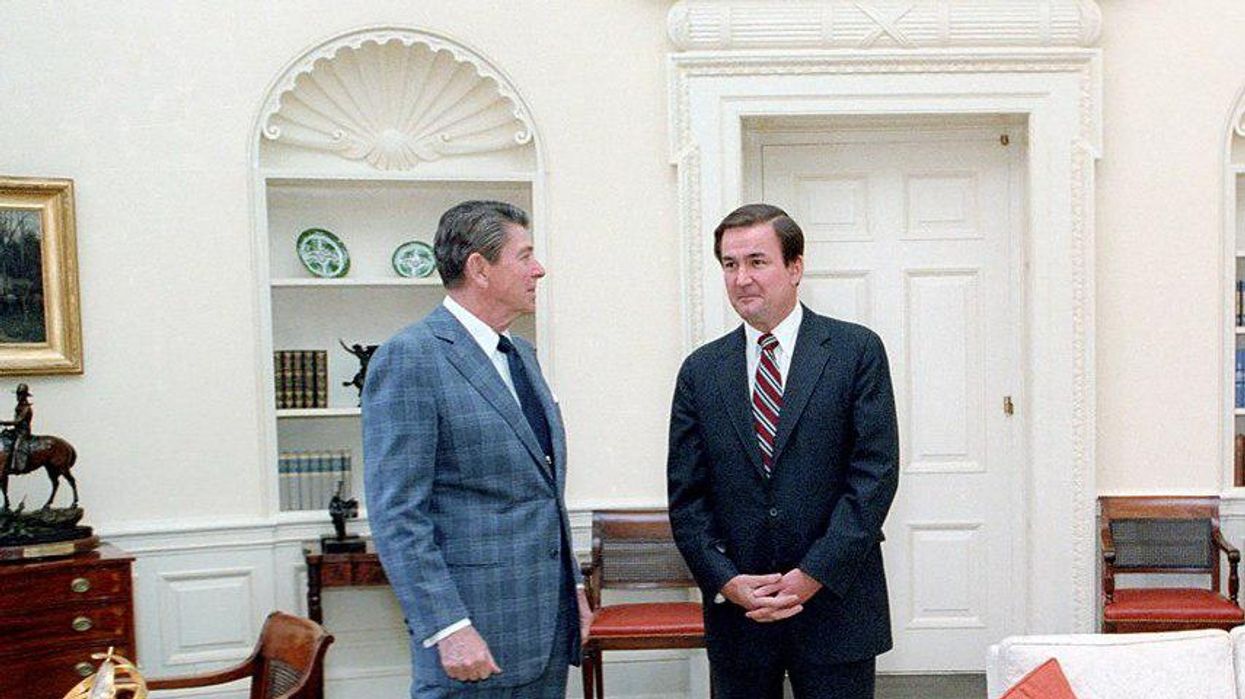How Patrick Buchanan’s 1992 campaign became the blueprint for Trumpism: conservative


When Donald Trump defeated all of the other Republican candidates in the 2016 GOP presidential primary and went on to defeat Democratic nominee Hillary Clinton in the general election — even though he lost the popular vote — one of the people who was celebrating was paleoconservative Patrick Buchanan, who realized that Trumpism was Buchananism. This week in an in-depth essay for The Bulwark, Never Trump conservative Brian Stewart examines Buchanan's influence on Trumpism, which has replaced Reaganism as the dominant philosophy of the Republican Party. And Stewart argues that Trump has, in essence, turned the party of Ronald Reagan into the party of Patrick Buchanan.
The New York City-based Stewart writes, "Picture this: In a clash and clang of antagonism toward the Republican establishment, a sizable portion of the base of the party congeals around a vociferous, divisive figure…. This rambunctious tribune repudiates both the substance and style of the Republican Party — for decades the vessel for the conservative program — including its vigorous support for free trade and a decent international order…. His speeches infuriate both the Democrats and the GOP establishment, which only cements his bond with the base. Not Donald Trump in 2016, but Pat Buchanan in 1992."
When President George H. W. Bush was seeking reelection 29 years ago, he faced an aggressive Republican primary challenge from Buchanan. Bush won the primary, but Buchanan saw that there was an audience on the right for his "America first" or paleoconservative philosophy — an angry, pseudo-populist mixture of isolationism, social conservatism, protectionism and hyper-nationalism.
Bush 41 had high approval ratings in early 1991 following the Persian Gulf War, and at that point, some Democratic strategists were despairing that they were likely to lose four presidential elections in a row. But Bush's approval ratings plummeted when the U.S. went into a tough recession, and Buchanan tapped into that discontent. So did conservative third-party candidate Ross Perot and Democratic presidential nominee Bill Clinton, who won the general election.
Stewart explains, "Former White House aide to two Republican presidents, Buchanan had grown alienated from the party of Lincoln on account of its core philosophical premises and policy commitments. A quarter of a century before Trump declared his candidacy for the nation's highest office on a platform of 'America First,' Pat Buchanan beat the New York real estate mogul to the punch: 'We will put America first,' Buchanan said in 1991."
Some GOP strategists were furious with Buchanan in 1992, blaming his primary challenge for Bush's loss to Clinton and arguing that Buchanan weakened Bush's campaign. And neocons detested Buchanan's isolationist foreign policy views. But Buchananism still had its followers on the right, and according to Stewart, one of the most famous was Trump.
Stewart notes that a 1990 essay by Buchanan, which was published by the National Interest and headlined "America First — and Second, and Third," seems very Trumpian in retrospect.
Stewart points out that Buchanan used the term "cultural war" during his speech at the 1992 Republican National Convention, adding that his rhetoric also included the Trump-like terms "forgotten Americans" and "conservatives of the heart." In 1992, according to Stewart, Buchanan wielded a "pitchfork" that was "fashioned for future use" — and in 2016, that user was Donald Trump, who remade the GOP in his image.
The fact that Trump turned the party of Reagan into the party of Buchanan is not something that Stewart and other conservatives who write for The Bulwark are happy about. Although The Bulwark is a right-wing website, it is vehemently anti-Trump — and many of its writers, from Bill Kristol, Tim Miller and Amanda Carpenter to Charlie Sykes and Mona Charen — cheered for now-President Joe Biden in the 2020 election.
Stewart concludes his essay by lamenting that Trumpism/Buchananism is now fully in control of the GOP, and he doesn't see that changing anytime soon.